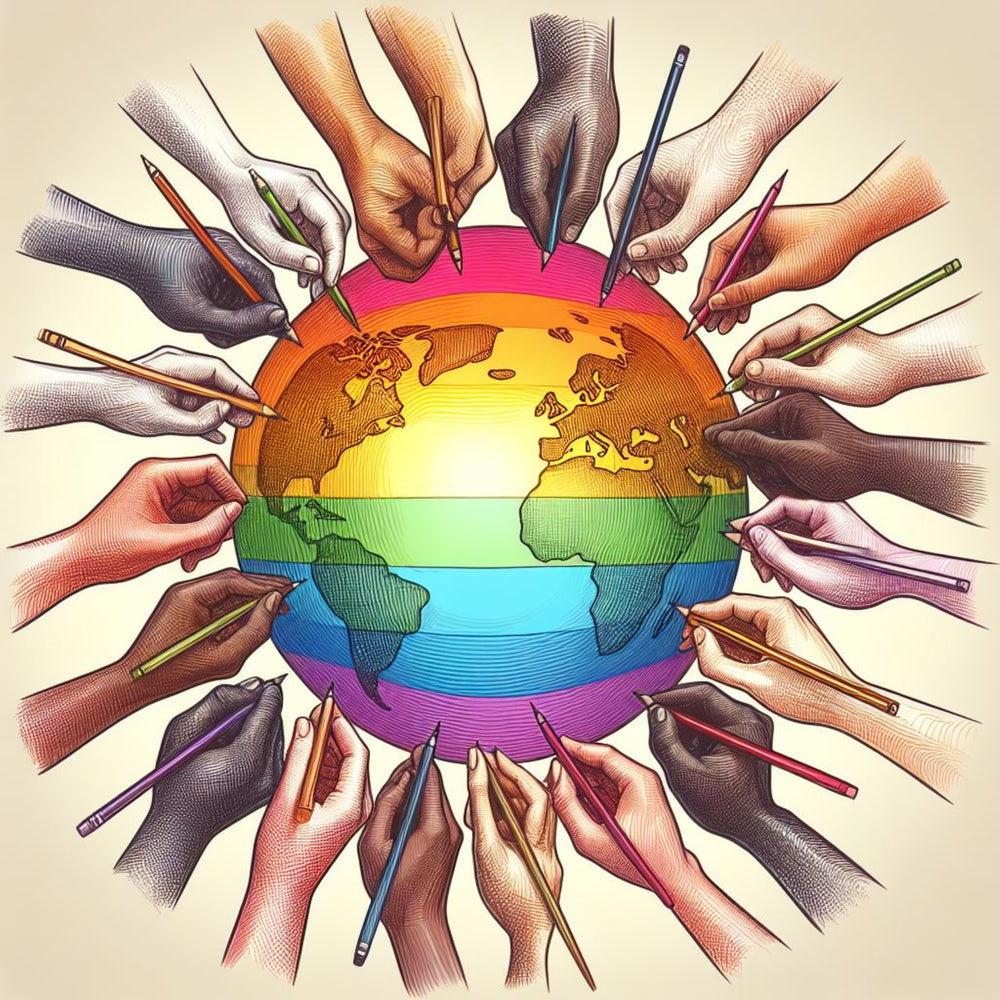How Are The Jewish, Muslim And Christian Faiths Similar And How Are They Different. Why Is Is So Hard For The Major Faiths To Live In Peace Together?
by Darrell Griffin
I am a Christian. One of my best friends is a devout Muslim and one is an observant Jew. We have some really lively discussions. One thing we all agree on is there is one God. I believe that all three of us pray to the same God.
Introduction: Exploring The Similarities And Differences Between Judaism, Islam, And Christianity
Exploring the similarities and differences between Judaism, Islam, and Christianity is a journey into the heart of humanity's spiritual landscape. These three Abrahamic religions share a common foundation, yet their paths diverge in significant ways, reflecting diverse interpretations of faith, practice, and divine revelation. The roots of Judaism stretch back to ancient times when Abraham’s covenant with God laid the groundwork for a monotheistic belief system that would later influence countless generations. [Sources: 0, 1, 2]
Christianity emerged from Judaism with the teachings of Jesus Christ, emphasizing salvation and eternal life through his crucifixion and resurrection.

Islam, while recognizing both Abraham and Jesus as prophets, was founded in the 7th century by Prophet Muhammad, whose revelations culminated in the Quran. [Sources: 3, 4]
The core similarity among these faiths lies in their monotheistic essence – the belief in one omnipotent and compassionate God. This shared conviction fosters a profound spiritual kinship that has historically transcended geographical boundaries. Moreover, ethical principles such as charity, justice, and compassion towards others are universal values deeply embedded within their teachings. [Sources: 5, 6, 7]
However, theological divergences have also sown seeds of discord over millennia. Differences in sacred texts, prophets' roles, religious laws (Sharia for Muslims), rituals (such as prayer practices), and perspectives on salvation have led to misunderstandings and conflicts among followers. [Sources: 8, 9]

The complexity of these relationships is further compounded by historical grievances—territorial disputes dating back centuries—making reconciliation challenging at times. The quest for peaceful coexistence among these major faiths requires not only tolerance but also a deep understanding of each other’s beliefs and traditions—an understanding that acknowledges both commonalities and differences without diminishing their respective spiritual worths. [Sources: 7, 10]
Historical Conflicts And Tensions Among The Major Faiths

Historical conflicts and tensions among the Jewish, Muslim, and Christian faiths have deep roots that stretch back centuries. These conflicts often arose from territorial disputes, theological disagreements, and political power struggles. One of the earliest examples of such conflict is the Crusades (1096-1291), a series of religious wars initiated by Christians to reclaim Jerusalem and the Holy Land from Muslim rule. [Sources: 11, 12, 13]
This period was marked by extreme violence on both sides, sowing seeds of mistrust that would linger for generations. [Sources: 14]
In the Iberian Peninsula, the Reconquista (711-1492) saw Christian kingdoms fighting to recapture territory from Muslim rulers who had established themselves in present-day Spain and Portugal. This long conflict ended with the expulsion or forced conversion of Muslims (and Jews) from Spain in 1492, a stark example of how religious identity was intertwined with political sovereignty. [Sources: 15, 16]
The Middle East has been another flashpoint for interfaith tensions, particularly between Jews and Muslims over the land known as Palestine to Arabs and Israel to Jews. The creation of the State of Israel in 1948 led to several Arab-Israeli wars and ongoing conflicts over territories claimed by Palestinians. These disputes are not only about land but also about sacred spaces revered by both faiths. [Sources: 11, 17, 18]
Despite these historical conflicts, it's essential to recognize that periods of peaceful coexistence have also occurred when these faith communities have lived side by side, contributing to shared cultures especially evident in regions like Andalusia before the Reconquista. [Sources: 18]
The difficulty in achieving lasting peace among these major faiths today can be attributed partly to their complex histories. Historical grievances are frequently invoked in contemporary disputes, making reconciliation challenging. Moreover, extremist factions within each religion can exacerbate tensions by refusing compromise or dialogue based on rigid interpretations of their respective faiths' teachings. [Sources: 19, 20, 21]
Interfaith Dialogue: The Importance Of Tolerance And Understanding
Interfaith dialogue plays a crucial role in fostering tolerance and understanding among the world's major faiths, including Judaism, Christianity, and Islam. These religions share a historical foundation, acknowledging Abraham as a patriarch, and they all emphasize principles of compassion, charity, and the pursuit of justice. Despite these commonalities, differences in doctrine, worship practices, and interpretations of sacred texts have often led to tensions. [Sources: 7, 22, 23]
The importance of interfaith dialogue cannot be overstated in our increasingly interconnected world. It provides a platform for members of different faith communities to come together to discuss their beliefs openly and respectfully. Through such exchanges, individuals can discover the shared values that unite them across religious divides and gain insights into the nuanced differences that characterize their spiritual paths. [Sources: 21, 24, 25]
By focusing on mutual respect and understanding rather than on converting one another or proving one's faith superior, interfaith dialogue encourages participants to see beyond stereotypes and misconceptions. This shift in perspective is essential for building bridges between communities that have historically been at odds. It helps demystify the 'other,' reducing fear and suspicion while promoting empathy. [Sources: 14, 26, 27]
Moreover, engaging in dialogue does not mean diluting one's beliefs but rather deepening one’s understanding of both one’s own faith and that of others. It fosters an environment where people can agree to disagree peacefully without resorting to conflict or coercion. [Sources: 14, 28]
In an era marked by religiously motivated violence and rising intolerance, cultivating spaces for constructive interfaith engagement becomes imperative. Such efforts pave the way toward peaceful coexistence by highlighting shared human values over divisive dogma. In essence, tolerance bred from genuine understanding forms the cornerstone upon which harmonious interfaith relations can be built. [Sources: 22, 29, 30]
Comparison Of Rituals, Holy Sites, And Traditions In Judaism, Islam, And Christianity
Within the diverse tapestry of world religions, Judaism, Islam, and Christianity hold profound similarities and distinctions in their rituals, holy sites, and traditions. These elements not only define each faith's unique identity but also serve as a bridge connecting these Abrahamic religions through shared ancestry and spiritual heritage. Rituals across these faiths underscore both unity and disparity. For instance, prayer is fundamental to all three, yet its execution varies: Muslims pray five times daily facing Mecca; Jews observe three daily prayer sessions and additional ones on the Sabbath and religious holidays; while Christians typically pray according to personal schedule or during weekly church services. [Sources: 7, 11, 31, 32]
The ritual of fasting is another point of convergence—Yom Kippur in Judaism, Ramadan in Islam, and Lent in Christianity—each reflecting themes of atonement, reflection, and sacrifice. Holy sites further illustrate the intertwined yet distinct paths of these religions. Jerusalem emerges as a focal point for all: the Temple Mount holds significance for Jews as the location of the first two temples; for Muslims, it houses Al-Aqsa Mosque and is celebrated as the destination of Muhammad’s night journey; Christians revere it as the setting of Jesus’ crucifixion and resurrection. [Sources: 7, 33, 34]
Despite this shared reverence, differing views on these sacred spaces often fuel tensions rather than foster unity. Traditions within each faith reveal a rich cultural tapestry that informs followers' daily lives. From dietary laws (Kosher in Judaism, Halal in Islam) to religious holidays (Passover for Jews, Eid al-Fitr for Muslims, Easter for Christians), these practices are deeply ingrained expressions of faith. [Sources: 18, 35, 36]
The challenge in achieving peace among these major faiths lies not within their core teachings—which often advocate for compassion and understanding—but rather in historical conflicts, political interests, and cultural divides that have complicated their coexistence. [Sources: 37]
Monotheism In The Jewish, Muslim, And Christian Faiths
Monotheism, the belief in a single, all-powerful God, is a foundational principle that unites the Jewish, Muslim, and Christian faiths. These religions share a common ancestry traced back to Abraham, a patriarch whose covenant with God establishes him as a central figure in their spiritual narratives. Despite their shared monotheistic framework, the way each religion understands and relates to the divine varies significantly, contributing both to their unique identities and to the complexities of their interfaith dynamics. [Sources: 2, 7, 38]
In Judaism, monotheism is absolute. God is singularly transcendent, having no physical form and being beyond human comprehension. This strict monotheism emphasizes direct worship and obedience to God’s laws as revealed in the Torah. Christianity originated from Judaism but introduced the concept of the Trinity—God as Father, Son (Jesus Christ), and Holy Spirit—a doctrine that asserts one God in three persons. [Sources: 5, 7, 39]
This conceptualization does not dilute Christianity's monotheistic essence but instead offers a unique interpretation of God's nature and relationship with humanity. [Sources: 40]
Islam strongly affirms monotheism through its core creed: "There is no god but Allah." In the Christian faith there are many names for God. My children call me dad, my wife calls Darrell and co-workers call me "Griff." Different names but I am the same person no matter what one calls me. Muslims emphasize Allah's oneness (Tawhid) as central to their faith. Islam regards Jesus not as divine but as one of its prophets, venerating Muhammad as the final prophet through whom Allah’s ultimate revelations were delivered. [Sources: 3, 41, 42]
The theological nuances among these three religions illustrate both shared reverence for one God and significant doctrinal divergences that have historically fueled theological debates and misunderstandings. While their monotheistic beliefs provide common ground for dialogue, differences in understanding God's nature and revelations contribute to challenges in achieving interfaith harmony. Recognizing these distinctions while appreciating their shared commitment to worshiping one God could pave the way for increased mutual respect and peaceful coexistence among these major faith traditions. [Sources: 22, 43, 44]
Extremism And Fundamentalism: How Misunderstandings Lead To Conflict
Extremism and fundamentalism within the Jewish, Muslim, and Christian faiths have significantly contributed to misunderstandings that exacerbate conflicts among these religious communities. At the heart of each of these monotheistic religions lies a call for peace, compassion, and coexistence. However, extreme interpretations often overshadow these core teachings, leading to an emphasis on divisive doctrines rather than shared values. [Sources: 14, 20, 43]
Fundamentalist groups within each faith tend to interpret religious texts in a literal and uncompromising way. This rigidity can lead to an exclusionary worldview where only those who adhere strictly to specific beliefs or practices are considered true followers. Such perspectives often disregard the complex historical contexts in which these religions developed and evolved alongside one another. By focusing on differences rather than commonalities, extremism fosters an environment ripe for conflict. [Sources: 45, 46, 47, 48]
Misunderstandings arise when actions or beliefs of extremists are perceived as representative of the entire faith community. This misrepresentation can fuel stereotypes and prejudice, further entrenching divisions between religious groups. The media’s focus on sensational stories exacerbates this issue by amplifying the voices of extremists while silencing those who advocate for interfaith dialogue and understanding. [Sources: 14, 49, 50]
The path toward peaceful coexistence is hindered by these misunderstandings. Efforts to bridge gaps between Jewish, Muslim, and Christian communities are often overshadowed by fear and suspicion generated by extremist ideologies. Overcoming this challenge requires a concerted effort from religious leaders and followers alike to emphasize shared ethical foundations over divisive dogma. [Sources: 18, 51, 52]
In essence, extremism and fundamentalism distort the essence of faiths that have more similarities than differences at their core. By recognizing this fact and working towards mutual understanding, there is hope for overcoming conflicts that have long separated these major religious traditions. [Sources: 26, 48]
Stereotypes, Prejudices, And The Impact On Peaceful Coexistence
Stereotypes, prejudices, and the subsequent impact on peaceful coexistence among the Jewish, Muslim, and Christian faiths are deeply ingrained issues that have historical roots stretching back centuries. These misconceptions often emerge from a lack of understanding or misinformation about the religious practices, beliefs, and values of each faith. For instance, stereotypes may paint one religion as inherently more violent or intolerant than another, despite the core teachings of all three religions advocating for peace and understanding. [Sources: 21, 53, 54]
Prejudices against specific religions can manifest in various ways, ranging from subtle discrimination in social settings to outright hostility and violence. These biases not only foster an environment of mistrust among followers of different faiths but also contribute to the dehumanization of individuals based on their religious identity. This atmosphere makes it challenging for adherents of Jewish, Muslim, and Christian communities to engage with one another openly and respectfully. [Sources: 14, 55]
The impact of these stereotypes and prejudices on peaceful coexistence cannot be understated. They act as barriers to dialogue and mutual understanding by perpetuating fear and animosity. This situation is further complicated by political conflicts that often exploit religious differences for strategic purposes. The resulting cycle of mistrust and retaliation makes it difficult for communities to come together in times of crisis or work collaboratively towards common goals. [Sources: 26, 56, 57, 58]
For these major faiths to live in peace together, it is imperative to address stereotypes and prejudices head-on through education that emphasizes the shared values among these religions while respecting their unique differences. Interfaith dialogues can play a critical role in breaking down barriers by encouraging empathy, understanding, and cooperation among followers of different faith traditions. [Sources: 29, 59]
Political Tensions And Territorial Disputes Among Followers Of Different Faiths
Political tensions and territorial disputes have long been at the heart of conflicts among followers of the Jewish, Muslim, and Christian faiths. These tensions often stem from historical claims to sacred lands and sites that are considered holy by all three religions. Jerusalem is perhaps the most prominent example, revered by Jews as the site of their ancient temple, by Christians as the place where Jesus was crucified and resurrected, and by Muslims as the location of Muhammad's night journey to heaven. [Sources: 18, 60, 61]
The overlapping spiritual significance of such places has led to enduring disputes over sovereignty and control. [Sources: 18]
These territorial disagreements are further complicated by political factors. The establishment of Israel in 1948, for instance, sparked ongoing conflict with Palestinian Muslims over land rights and statehood, intertwining religious identity with nationalistic fervor. Similarly, various Christian-majority countries have engaged in geopolitical maneuvers in the Middle East that are often perceived by Muslim populations as modern crusades, exacerbating tensions. [Sources: 45, 62, 63]
Moreover, these faith communities do not exist in isolation; they interact within a global context where power dynamics shift and international politics play a significant role. External forces can exploit religious differences for their own strategic ends, deepening divisions among these faiths. [Sources: 11]
The challenge in achieving peace lies not only in reconciling theological differences but also in addressing these deeply rooted political issues. Negotiating a balance between religious claims to sacred sites and territories with political sovereignty demands a nuanced understanding of both faith traditions and modern geopolitical realities. Until these underlying causes of conflict are addressed comprehensively, achieving lasting peace among followers of the Jewish, Muslim, and Christian faiths will remain a formidable task. [Sources: 14, 18, 64]
Education As A Tool For Promoting Human Rights And Social Issues In Interfaith Relationships
Education stands as a pivotal tool in bridging the divides between the Jewish, Muslim, and Christian faiths, not merely through academic dissemination but by fostering understanding, respect, and empathy among these religious communities. The essence of education in this context transcends conventional classroom learning; it involves an immersive experience into the historical narratives, theological foundations, and cultural practices that shape each faith tradition. [Sources: 23, 65]
This broadened educational approach promotes human rights by highlighting the common moral and ethical threads that run through Judaism, Islam, and Christianity—such as the principles of compassion, justice, and stewardship of creation. [Sources: 7]
Moreover, education plays a critical role in addressing social issues inherent in interfaith relationships. By providing platforms for dialogue and interaction among followers of these religions, education dismantles stereotypes and preconceptions that often fuel mistrust and conflict. It encourages individuals to see beyond their differences to their shared human values and aspirations. This process is not without its challenges; deeply ingrained beliefs and historical grievances can impede mutual understanding. [Sources: 29, 44, 66]
However, when education incorporates perspectives that emphasize shared human dignity alongside the unique contributions of each faith tradition to our global heritage, it lays down a foundation for peaceful coexistence. In this light, educators are not just imparting knowledge but are actively participating in peace-building efforts. They equip individuals with the critical thinking skills necessary to question prejudice and with the interpersonal skills needed for constructive interfaith engagement. [Sources: 67, 68, 69]
In conclusion, while differences in doctrine may delineate distinct paths within Judaism, Islam, and Christianity, education offers a unifying bridge by advocating for mutual respect rooted in an appreciation of each faith's intrinsic value. Through such educational endeavors lies a hopeful pathway towards overcoming divisions and nurturing a world where diverse religious communities coexist peacefully. [Sources: 70, 71]
Conclusion: Moving Towards Peaceful Coexistence Through Cultural Understanding In A Globalized World
In our exploration of the Jewish, Muslim, and Christian faiths, we have traversed the intricate tapestry that both unifies and divides these Abrahamic religions. Each tradition carries its unique narratives, practices, and theological frameworks; yet at their core lies a shared heritage—a lineage tracing back to Abraham—that emphasizes compassion, justice, and the pursuit of a righteous path. The differences that exist are often amplified by historical grievances, political conflicts, and cultural misunderstandings rather than inherent theological discordance. [Sources: 7, 23, 72]
As we venture forth into an increasingly globalized world—a world where cultures intersect more freely and diverse populations intermingle—the call for mutual understanding and respect becomes not just beneficial but essential for peaceful coexistence. Recognizing our common humanity while appreciating our distinct traditions can serve as a bridge across the chasms created by centuries of mistrust and conflict. [Sources: 26, 73]
The path towards peace is not merely about tolerance but about active engagement with 'the other.' It involves creating spaces for dialogue where difficult conversations can occur without fear of retribution—spaces where individuals are encouraged to share their beliefs, listen earnestly to those of others, and collaboratively explore solutions to shared challenges. Educational systems that emphasize interfaith literacy alongside cultural exchange programs can play pivotal roles in dismantling stereotypes and building empathy among future generations. [Sources: 26, 44, 74]
In conclusion, achieving peaceful coexistence among the major faiths is an attainable goal if pursued through concerted efforts aimed at fostering cultural understanding and mutual respect. By embracing our shared values while acknowledging our differences with openness and humility, we pave the way towards a more harmonious global community—one where diversity is celebrated as a source of strength rather than division. [Sources: 21, 75]
##### References #####
[0]: https://religiousstudies.yale.edu/publications/jews-christians-muslims-comparative-introduction-monotheistic-religions
[1]: https://www.linkedin.com/pulse/20140901144550-109819820-ten-surprising-similarities-between-judaism-islam
[2]: https://www.alislam.org/articles/judaism-christianity-islam-common-tradition/
[3]: https://www.linkedin.com/pulse/comparative-theology-differences-between-judaism-islam-mohd-hamid-p5rqf
[4]: https://en.wikipedia.org/wiki/Islam_and_violence
[5]: https://www.thecollector.com/understanding-monotheism-religions/
[6]: https://2009-2017.state.gov/j/drl/rls/rm/2016/263725.htm
[7]: https://ummah.com/similarities-and-differences-between-judaism-christianity-and-islam/
[8]: https://fullerstudio.fuller.edu/dialogue-witness-tolerance-many-dimensions-interfaith-encounters/
[9]: https://www.redalyc.org/journal/2911/291166073007/html/
[10]: https://www.start.umd.edu/publication/religious-fundamentalism-middle-east-cross-national-inter-faith-and-inter-ethnic
[11]: https://dokumen.pub/judaism-christianity-and-islam-an-introduction-to-monotheism-9781474257251-9781474257244-9781474257282-9781474257268.html
[12]: https://library.fiveable.me/ap-euro/unit-2/wars-religion/study-guide/EGM2pS20VWvPTJslv7Se
[13]: https://www.britannica.com/topic/history-of-Europe/Christianity-Judaism-and-Islam
[14]: https://fastercapital.com/content/Religious-diversity-score--Embracing-Pluralism-for-Peaceful-Coexistence.html
[15]: https://www.lamoncloa.gob.es/lang/en/espana/historyandculture/history/Paginas/index.aspx
[16]: https://www.history.com/topics/religion/judaism
[17]: http://www.pbs.org/wgbh/globalconnections/mideast/themes/culture/
[18]: https://dokumen.pub/choreographies-of-shared-sacred-sites-religion-politics-and-conflict-resolution-9780231538060.html
[19]: http://www.scielo.org.za/scielo.php?script=sci_arttext&pid=S0259-94222017000600005
[20]: https://www.beyondintractability.org/essay/religion_and_conflict%20
[21]: http://www.erissociety.org/religious-tolerance-and-interfaith-dialogue/
[22]: https://parisbyemy.com/interreligious-dialogue/
[23]: https://ej-theology.org/index.php/theology/article/view/125
[24]: https://tilkingdomcomefilm.com/the-importance-of-interfaith-dialogue
[25]: https://aeinspiredlife.com/en/inter-religious-dialogue-promoting-peace-and-understanding/
[26]: https://fastercapital.com/topics/moving-forward-with-interfaith-dialogue.html
[27]: https://islamicvoice.com/interfaith/interfaith-dialogue-and-religious-tolerance/
[28]: https://aboutislam.net/counseling/ask-about-islam/one-god-many-faiths/
[29]: https://fastercapital.com/content/Not-Walls--Interfaith-Dialogue-vs--Forced-Conversion.html
[30]: https://gchragd.org/interfaith-dialogue-and-reconciliation-2/
[31]: https://www.cram.com/essay/What-Are-The-Similarities-Of-Islam-And/FK48FQXKUZ3W
[32]: https://courses.lumenlearning.com/suny-esc-introtosociology/chapter/world-religions/
[33]: https://www.nytimes.com/2005/12/17/arts/television/looking-for-similarities-where-others-see-differences.html
[34]: https://www.beinharimtours.com/jerusalem-for-three-religions/
[35]: https://infogram.com/blog/world-day-for-cultural-diversity/
[36]: https://ivypanda.com/essays/world-religions/
[37]: https://www3.gmu.edu/programs/icar/pcs/ASNC83PCS.htm?gmuw-rd=sm&gmuw-rdm=ht
[38]: https://www.bartleby.com/essay/Monotheistic-Religions-Of-Judaism-Christianity-And-Islam-PC8FDD75RR
[39]: https://www.samharris.org/blog/sam-harris-vs-andrew-sullivan
[40]: https://issuu.com/trinitycollegecollections/docs/trinitypaper26_at_000150/s/12107199
[41]: http://thecurriculum.org/the-difference-of-judaism-to-buddhism-christianity-and-islam/
[42]: https://www.bartleby.com/essay/The-Similarities-Between-Christianity-Islam-And-Judaism-2521B156E90FAAB9
[43]: https://www.linkedin.com/pulse/understanding-roots-division-between-christianity-islam-khurshid-
[44]: https://gradesfixer.com/free-essay-examples/the-importance-of-interfaith-dialogue/
[45]: https://opentext.wsu.edu/introtohumangeography/chapter/6-4-religious-conflict/
[46]: https://www.mdpi.com/journal/religions/special_issues/Politics_Religion
[47]: https://www.thekjvstore.com/articles/the-differences-between-judaism-christianity-and-islam/
[48]: https://www.ncbi.nlm.nih.gov/pmc/articles/PMC6876432/
[49]: http://www.theinterfaithobserver.org/journal-articles/2011/9/14/a-safe-place-to-address-prejudice-stereotypes-and-fears.html
[50]: https://www.mvtimes.com/2024/03/27/faith-religion-war-gaza/
[51]: http://www.pbs.org/wgbh/globalconnections/mideast/themes/religion/index.html
[52]: https://www.usccb.org/committees/ecumenical-interreligious-affairs/vatican-council-and-papal-statements-islam
[53]: https://obsreligion.cnrs.fr/bulletin/governing-interreligious-relations-and-politicising-moderation-navigating-between-government-and-grassroots-interfaith-initiatives-in-contemporary-indonesia-english-version/
[54]: http://www.scielo.org.za/scielo.php?script=sci_arttext&pid=S0259-94222020000300007
[55]: https://www.iis.ac.uk/learning-centre/scholarly-contributions/academic-articles/muslim-jews-and-christians-relations-and-interactions/
[56]: https://www.verywellmind.com/what-is-prejudice-2795476
[57]: https://www.encyclopedia.com/social-sciences/news-wires-white-papers-and-books/religious-prejudice-0
[58]: https://www.oikoumene.org/resources/documents/ecumenical-considerations-for-dialogue-and-relations-with-people-of-other-religions
[59]: https://www.graygroupintl.com/blog/freedom-of-religion
[60]: https://www.thenationalnews.com/uae/pope-2019/islam-and-christianity-a-long-complex-and-crucial-relationship-1.818103
[61]: https://brianzahnd.com/2015/03/christian-perspective-israeli-palestinian-conflict/
[62]: https://www.history.com/news/why-jews-and-muslims-both-have-religious-claims-on-jerusalem
[63]: https://www.oikoumene.org/resources/documents/issues-in-christian-muslim-relations-ecumenical-considerations
[64]: https://www.usip.org/publications/2006/01/religious-contributions-peacemaking-when-religion-brings-peace-not-war
[65]: https://bulletin.case.edu/course-descriptions/rlgn/
[66]: https://medium.com/@zousan67/bridging-faiths-591a886608b4
[67]: https://www.crisisgroup.org/asia/south-east-asia/myanmar/290-buddhism-and-state-power-myanmar
[68]: https://www.graygroupintl.com/blog/culture-of-peace
[69]: https://www.kofiannanfoundation.org/articles/the-vital-role-of-interfaith-harmony-in-preventing-violent-extremism/
[70]: https://www.interfaith.cam.ac.uk/resources/lecturespapersandspeeches/jewschristiansandmuslimsmeetaroundtheirscriptures
[71]: https://fastercapital.com/topics/the-role-of-education-in-fostering-interfaith-relations.html/1
[72]: https://www.mohammedamin.com/Community_issues/Triangulating-the-Abrahamic-faiths.html
[73]: https://www.coexistwithpeace.com/coexistence-resources/
[74]: https://saferworldfoundation.org/blog/creating-a-culture-of-tolerance-and-peace-among-ethnic-groups/
[75]: https://www.ncronline.org/news/nigerias-interfaith-council-fosters-peaceful-christian-muslim-relations






Leave a comment